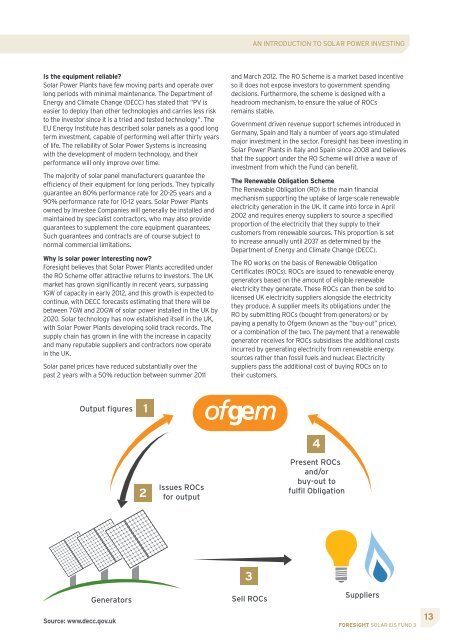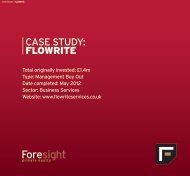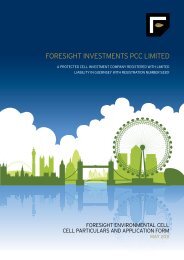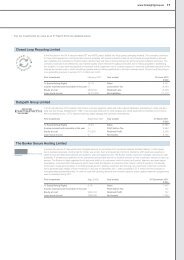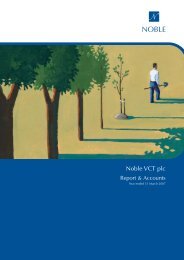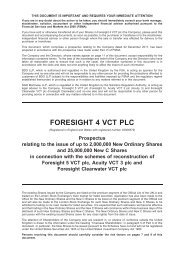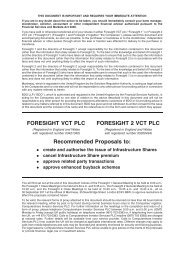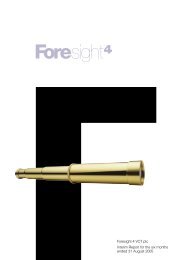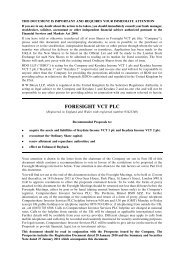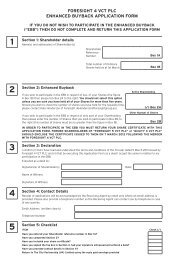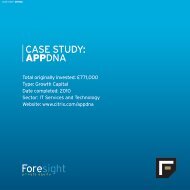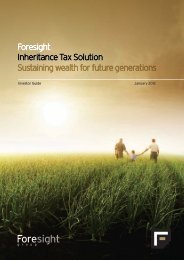Information Memorandum - Foresight Group
Information Memorandum - Foresight Group
Information Memorandum - Foresight Group
You also want an ePaper? Increase the reach of your titles
YUMPU automatically turns print PDFs into web optimized ePapers that Google loves.
Is the equipment reliable?<br />
Solar Power Plants have few moving parts and operate over<br />
long periods with minimal maintenance. The Department of<br />
Energy and Climate Change (DECC) has stated that “PV is<br />
easier to deploy than other technologies and carries less risk<br />
to the investor since it is a tried and tested technology”. The<br />
EU Energy Institute has described solar panels as a good long<br />
term investment, capable of performing well after thirty years<br />
of life. The reliability of Solar Power Systems is increasing<br />
with the development of modern technology, and their<br />
performance will only improve over time.<br />
The majority of solar panel manufacturers guarantee the<br />
efficiency of their equipment for long periods. They typically<br />
guarantee an 80% performance rate for 20-25 years and a<br />
90% performance rate for 10-12 years. Solar Power Plants<br />
owned by Investee Companies will generally be installed and<br />
maintained by specialist contractors, who may also provide<br />
guarantees to supplement the core equipment guarantees.<br />
Such guarantees and contracts are of course subject to<br />
normal commercial limitations.<br />
Why is solar power interesting now?<br />
<strong>Foresight</strong> believes that Solar Power Plants accredited under<br />
the RO Scheme offer attractive returns to Investors. The UK<br />
market has grown significantly in recent years, surpassing<br />
1GW of capacity in early 2012, and this growth is expected to<br />
continue, with DECC forecasts estimating that there will be<br />
between 7GW and 20GW of solar power installed in the UK by<br />
2020. Solar technology has now established itself in the UK,<br />
with Solar Power Plants developing solid track records. The<br />
supply chain has grown in line with the increase in capacity<br />
and many reputable suppliers and contractors now operate<br />
in the UK.<br />
Solar panel prices have reduced substantially over the<br />
past 2 years with a 50% reduction between summer 2011<br />
Output figures<br />
Generators<br />
Source: www.decc.gov.uk<br />
1<br />
2<br />
Issues ROCs<br />
for output<br />
AN INTRODUCTION TO SOLAR POWER INVESTING<br />
and March 2012. The RO Scheme is a market based incentive<br />
so it does not expose investors to government spending<br />
decisions. Furthermore, the scheme is designed with a<br />
headroom mechanism, to ensure the value of ROCs<br />
remains stable.<br />
Government driven revenue support schemes introduced in<br />
FORESIGHT SOLAR EIS FUND<br />
Germany, Spain and Italy a number of years ago stimulated<br />
major investment in the sector. <strong>Foresight</strong> has been investing in<br />
Solar Power Plants in Italy and Spain since 2008 and believes<br />
that the support under the RO Scheme will drive a wave of<br />
investment from which the Fund can benefit.<br />
The Renewable Obligation Scheme<br />
The Renewable Obligation (RO) is the main financial<br />
mechanism supporting the uptake of large-scale renewable<br />
electricity generation in the UK. It came into force in April<br />
2002 and requires energy suppliers to source a specified<br />
proportion of the electricity that they supply to their<br />
customers from renewable sources. This proportion is set<br />
to increase annually until 2037 as determined by the<br />
Department of Energy and Climate Change (DECC).<br />
The RO works on the basis of Renewable Obligation<br />
Certificates (ROCs). ROCs are issued to renewable energy<br />
generators based on the amount of eligible renewable<br />
electricity they generate. These ROCs can then be sold to<br />
licensed UK electricity suppliers alongside the electricity<br />
they produce. A supplier meets its obligations under the<br />
RO by submitting ROCs (bought from generators) or by<br />
paying a penalty to Ofgem (known as the “buy-out” price),<br />
or a combination of the two. The payment that a renewable<br />
generator receives for ROCs subsidises the additional costs<br />
incurred by generating electricity from renewable energy<br />
sources rather than fossil fuels and nuclear. Electricity<br />
suppliers pass the additional cost of buying ROCs on to<br />
their customers.<br />
3<br />
Sell ROCs<br />
4<br />
Present ROCs<br />
and/or<br />
buy-out to<br />
fulfil Obligation<br />
Suppliers<br />
FORESIGHT SOLAR EIS FUND 3<br />
13<br />
13


